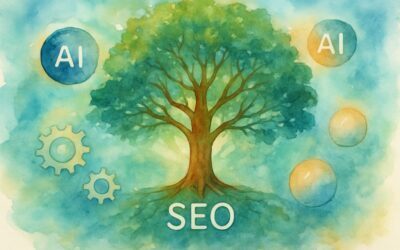When you’re trying to build your online presence, it’s easy to assume that keywords and SEO are one and the same. They’re closely related—but not interchangeable.
Keywords are a part of SEO. SEO is the broader strategy that helps your website rank in search results. If you’re trying to grow your business online – knowing the difference helps you make smarter marketing decisions.
TL;DR: Keywords Are Just One Piece of the SEO Puzzle
- Keywords are the terms people search for
- SEO is the full strategy that gets your site ranked
- SEO includes technical fixes, content, backlinks, and user experience
- Using keywords right is important—but it’s not enough
- SEO connects all the dots to help your site show up and get results
Keep reading to learn how keywords fit into SEO—and why understanding the difference matters for your business.
Defining Keywords and SEO
Let’s break it down clearly: keywords are the words people type into Google. SEO is the work you do to show up for those searches.
What Are Keywords?
Keywords are the specific terms people use when they search online. They come in a few forms:
- Short-tail: Broad terms like “web design” or “SEO”
- Long-tail: More specific phrases like “affordable SEO services in Windsor-Essex”
- Keyword phrases: Targeted phrases like “best web design Windsor-Essex”
Choosing the right keywords helps you attract people who are actually looking for what you offer. They guide your content and connect your site with the right audience.
What Is SEO?
SEO stands for search engine optimisation. It’s the strategy behind improving your visibility on Google and other search engines.
SEO involves:
- On-page fixes (like adding keywords and writing clear content)
- Technical improvements (like speeding up your site)
- Off-page strategies (like earning backlinks)
Together, these tactics help your site rank higher in search results and reach more people.
Key Differences Between Keywords and SEO
Keywords are individual terms. SEO is the full system designed to help your site rank for those terms.
Purpose and Role in Digital Marketing
Keywords help you understand what your audience is searching for. They reflect intent and guide the language you use in your content.
SEO, on the other hand, improves everything about your website—so search engines can find it, understand it, and recommend it to users. It’s about ranking well and delivering a good user experience.
Scope of Application
The scope of keywords is narrow—they show up in titles, blog posts, headings, meta descriptions, etc.
SEO’s scope is wide. It covers everything from keyword use to how fast your site loads, how it looks on mobile, and whether other sites link to yours.
How Keywords Fit Into SEO Strategies
Keywords aren’t the whole strategy—but they’re a crucial part of it.
Keyword Research
Before creating content, you need to know what your audience is searching for. Keyword research tools like Google Keyword Planner, SEMrush, and Ahrefs help you:
- Find high-value keywords
- Understand search volume
- Evaluate keyword difficulty
If you’re targeting Windsor-Essex, long-tail keywords like “local SEO services in Windsor” help attract motivated local buyers.
Keyword Integration and Density
Once you know your target keywords, integrate them naturally:
- In headings and subheadings
- In the opening and closing paragraphs
- In title tags, meta descriptions, and image alt text
A healthy keyword density (around 1–2%) avoids keyword stuffing and makes your content easy to read. Update older content regularly to refresh keywords and improve relevance.
The Components of SEO Beyond Keywords
Keywords matter—but if that’s all you focus on, your results will fall flat. Let’s look at the bigger picture.
On-Page Optimisation
This is everything you control on your web pages, including:
- Writing useful, well-structured content
- Organizing pages with H1s, H2s, and internal links
- Using optimized meta tags and descriptive ALT text
- Creating a clean navigation structure
Quick On-Page SEO Checklist:
- ✔ Unique, relevant content
- ✔ Proper heading hierarchy
- ✔ Internal linking
- ✔ Optimized images
- ✔ Meta titles and descriptions
Technical SEO Essentials
This is about what’s happening behind the scenes of your site. Strong technical SEO helps search engines crawl and understand your content.
Make sure your site has:
- Fast loading speed
- Mobile responsiveness
- Secure HTTPS connection
- An up-to-date XML sitemap
- No broken links or redirect chains
These elements help search engines trust your site—and users stick around longer.
Off-Page SEO and Authority Building
You also need to show Google that other people trust your site. That’s where off-page SEO comes in.
Backlinks and Link Building
Backlinks are links from other websites pointing to yours. They’re one of the strongest signals for SEO success.
To build good backlinks:
- Publish valuable, shareable content
- Reach out for guest blogging opportunities
- Get listed in trusted local directories
Avoid spammy links—quality over quantity matters here.
Authority and Visibility
Domain authority reflects how trustworthy your site appears to search engines. The more high-quality backlinks you have, the stronger your authority.
You can boost visibility by:
- Sharing expert-level content
- Getting local mentions or reviews
- Earning engagement from your audience
As your authority builds, so does your ability to rank—and reach more people locally and beyond.
Types of Keywords in SEO
Let’s break down the different types of keywords and how they serve your SEO goals.
Long-Tail, Short-Tail, and LSI Keywords
- Short-tail keywords: One or two words (e.g., “marketing,” “restaurant Windsor”)—high traffic, low conversion
- Long-tail keywords: More specific phrases (e.g., “best Italian restaurant in Windsor Ontario”)—lower traffic, higher conversion
- LSI keywords: Related terms that add context (e.g., “WordPress,” “responsive design” for the keyword “web design”)
Use a mix of these to cover broader search intent and rank for a wider variety of queries.
Informational, Navigational, and Transactional Keywords
- Informational: Used when people want to learn (e.g., “how to improve local SEO”)
- Navigational: Used to find a specific website (e.g., “Pivot Creative Media Windsor”)
- Transactional: Used by people ready to buy (e.g., “hire SEO expert Windsor”)
Each type targets users at a different stage of the buyer journey.
Frequently Asked Questions
What is the difference between SEO and keyword optimization?
SEO is the full process of improving your website’s visibility. Keyword optimization is just one part—focused on choosing and using the right words in your content.
How do keywords impact search engine optimisation efforts?
Keywords help search engines understand what your content is about. When used properly, they connect your site with users searching for related topics.
Can SEO be effective without focusing on keywords?
It’s possible to get some visibility with great content and user experience—but skipping keywords means you’re missing one of SEO’s most important tools.
What are the best practices for integrating keywords into SEO strategy?
- Research local search trends
- Use keywords naturally in your titles and body text
- Don’t overuse them—prioritize readability and relevance
How has the role of keywords in SEO evolved?
Today’s search engines understand context better. They focus on meaning and natural language, not just exact keyword matches.
What are common misconceptions about keywords in relation to SEO?
Some people think more keywords = better rankings. Others think SEO is just keyword stuffing. In reality, SEO is much broader—and smarter use of fewer keywords often works better.




